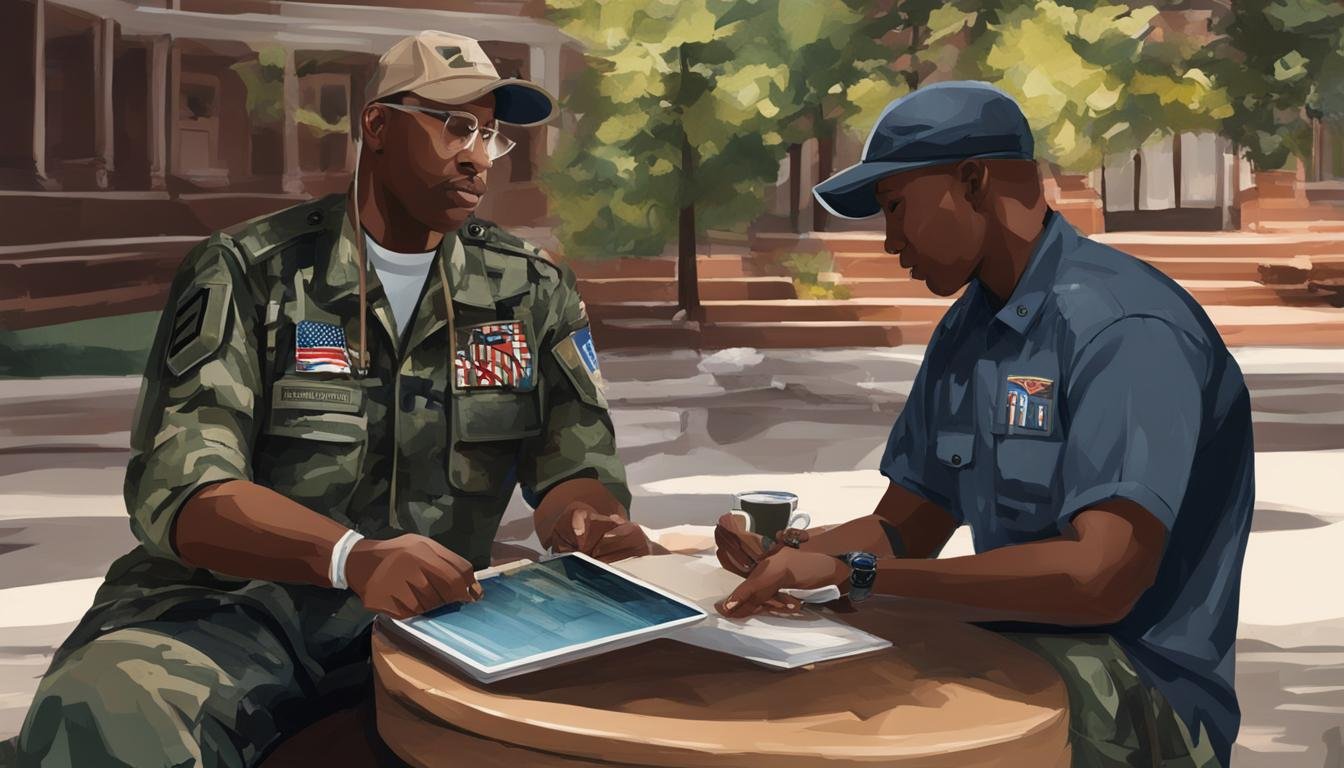Veteran students face unique challenges when transitioning from military to civilian life and pursuing higher education. They often require specialized support services to help them navigate this transition successfully. Evaluating the support system in veteran-friendly colleges is crucial to ensure that these institutions are effectively meeting the needs of their veteran students. This section will examine the efficacy of support programs for veteran students and explore the relationship between school funding, VA benefit funding, academic success, and graduation rates in veteran-friendly colleges.
Key Takeaways:
- Evaluating the support system in veteran-friendly colleges is essential for meeting the needs of veteran students.
- Specialized support services are necessary to help veteran students successfully transition to civilian life and pursue higher education.
- The effectiveness of support programs for veteran students can be assessed through various factors, including school funding, VA benefit funding, academic success, and graduation rates.
- Veteran-friendly colleges should provide a range of support services, such as academic support, financial aid, career services, and mental health support.
- Assessing the support systems in veteran-friendly colleges helps ensure that veteran students receive the assistance they need to thrive academically and personally.
The Efficacy of Support Programs for Veteran Students

A quantitative, historical, non-experimental correlational study conducted at the University of Arkansas aimed to determine the efficacy of programs for veteran students. The study utilized stress processing theory as the theoretical framework and investigated the relationships between school funding, VA benefit funding, academic success, and graduation rates for veteran students.
The findings of the study revealed significant correlations between the level of school funding and the academic success and graduation rates of veteran students. Specifically, higher levels of school funding were associated with higher rates of academic success and graduation among veteran students. This highlights the importance of adequate financial resources in supporting the educational journey of veterans.
Additionally, the study found a positive relationship between the availability of VA benefit funding and the academic success and graduation rates of veteran students. Institutions that invested in securing and promoting VA benefits for their veteran students demonstrated higher rates of academic success and graduation. This indicates that leveraging VA benefits can be an effective strategy for supporting the educational goals of veterans.
Moreover, the study highlighted the significance of academic support services in promoting the success of veteran students. Institutions that provided comprehensive academic support, such as tutoring programs, study resources, and mentoring, reported higher rates of academic success and graduation among veteran students. This underlines the essential role of tailored support programs in assisting veteran students in overcoming the unique challenges they face.
The Efficacy of Support Programs
| School Funding | VA Benefit Funding | Academic Success | Graduation Rates | |
|---|---|---|---|---|
| Veteran-Friendly Colleges | Positive correlation | Positive correlation | Positive correlation | Positive correlation |
| Non-Veteran-Friendly Colleges | No significant correlation | No significant correlation | No significant correlation | No significant correlation |
In conclusion, the study highlights the positive impact of support programs for veteran students in promoting their academic success and graduation rates. Adequate school funding, access to VA benefits, and comprehensive academic support services play pivotal roles in facilitating the educational journey of veterans. By evaluating and enhancing the support system in veteran-friendly colleges, we can ensure that these institutions effectively meet the needs of their veteran students.
How Can the Support System in Veteran-Friendly Colleges Be Improved to Better Serve Veterans?
Veteran-friendly colleges can enhance the effectiveness of veteran support programs by offering more targeted counseling services and mental health resources. Moreover, creating peer mentorship programs and specialized academic accommodations can contribute to the overall effectiveness of veteran support programs on college campuses.
Assessing Support Systems in Veteran-Friendly Colleges
In order to effectively evaluate the support system in veteran-friendly colleges, it is essential to assess the various support services and resources available to veteran students. These support systems play a crucial role in ensuring the success and well-being of veterans as they navigate their higher education journey.
One key aspect to consider in support system evaluation is the availability of academic support and advising. Veteran students often have unique academic needs, and having dedicated advisors who understand their challenges can make a significant difference in their educational experience.
Financial aid and scholarships also play a vital role in supporting veteran students. By evaluating the availability and accessibility of these resources, institutions can ensure that veterans have the financial support they need to pursue their educational goals without added stress or financial burden.
Furthermore, evaluating the availability of career services and transition assistance is crucial. Veteran students may require specialized guidance in translating their military experience into meaningful careers. Assessing the quality and effectiveness of these services can help identify areas of improvement to better support veteran students in their transition to the civilian workforce.
Mental health and wellness support is another critical component of the support system in veteran-friendly colleges. Assessing the availability of counseling services, support groups, and other mental health resources ensures that veterans have access to the help they need to address any challenges they may face during their academic journey.
Lastly, assessing the presence and effectiveness of on-campus military student organizations and resources is vital. These organizations provide a sense of community and camaraderie for veteran students, fostering a supportive environment where they can connect with peers who share similar experiences.
By thoroughly evaluating the support services and resources available to veteran students, colleges can ensure that they are effectively meeting the needs of this unique population. This assessment serves as a vital step in creating an inclusive and supportive environment where veteran students can thrive academically and personally.



